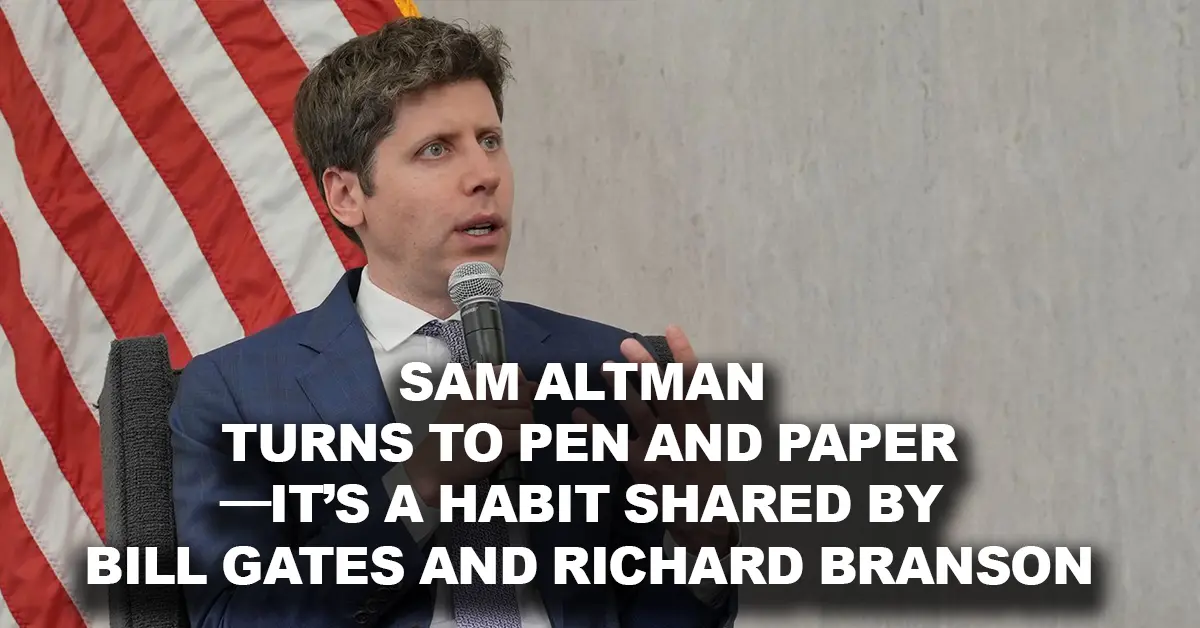When running AI giant OpenAI becomes too overwhelming, Sam Altman turns to pen and paper—it’s a habit shared by Bill Gates and Richard Branson

Sam Altman’s Unplugged Strategy
When you’re leading a $300 billion AI empire like OpenAI, things can get overwhelming. That’s when Sam Altman turns away from his computer screens and turns toward a notebook.
He revealed on the “How I Write” podcast that when faced with complex business challenges, his go-to move isn’t opening a new Notion tab or firing up ChatGPT. It’s picking up a pen.
“If I have a very hard problem, or if I feel a little bit confused about something, I have not found anything better than to sit down and make myself write it out.”
Writing as a Thinking Tool
Altman doesn’t see writing as just documenting thoughts. To him, it’s externalized thinking. When ideas feel tangled or fuzzy, putting them on paper forces clarity.
It’s like untangling a knot—you need to lay everything out in front of you to make sense of it. He believes writing sharpens your thinking and exposes the weak spots in your logic.
The Ritual of Writing
Altman’s note-taking is intentional, almost ritualistic. His must-haves?
- A pocket-size spiral notebook with a hard front and back.
- It must lay flat on the table.
- The paper must feel nice to write on.
- Pens: Uniball Micro 0.5mm or Muji 0.36/0.38mm in dark blue ink.
He’ll write, rip out the pages, lay them out to compare, and even crumple them up when he’s done. It’s tactile, messy, real.
Why Pen and Paper Still Matter in the AI Era
With AI tools like ChatGPT, you’d think handwriting is obsolete. But ironically, leaders in tech rely on paper to slow their minds down and think more deliberately.
Typing is fast, maybe too fast. Writing, however, is just slow enough to force focus. It’s like the difference between scrolling Twitter and sitting down with a good book.
Benefits of Handwritten Notes
🧠 Better Memory
Studies show that writing things by hand boosts memory and learning compared to typing.
🧘♂️ Mental Clarity
Writing is a calming, meditative act. It clears the mental fog.
🎨 Creative Freedom
There’s no backspace. Just raw, unfiltered thinking.
Scientific Backing
A Princeton-UCLA study found that students who took handwritten notes remembered concepts better than those who typed. Why? Because handwriting forces your brain to process, summarize, and understand instead of just transcribing.
Bill Gates: Legal Pads Over Laptops
Bill Gates may be a tech pioneer, but his methods remain classic.
“You won’t catch me in a meeting without a legal pad and pen in hand,” he shared on LinkedIn.
He even scribbles notes in the margins while reading books—just like a college student cramming for finals.
Richard Branson: The Notebook Evangelist
Branson is another billionaire who is rarely seen without a notebook.
“I go through dozens of notebooks every year and write down everything that occurs to me each day,” he says.
From meeting notes to random ideas on flights, he jots it all down. For him, capturing inspiration is like catching lightning in a bottle.
“An idea not written down is an idea lost.”
Modern vs Traditional Note-Taking
Gen Z may prefer iPhone Notes or voice memos, but the old-school method still wins with some of the smartest minds in the game.
Typing feels transactional. Writing feels intentional.
Sure, digital notes are convenient, but they don’t offer the same depth of thinking.
The Psychology Behind the Habit
Writing with your hand activates different brain pathways than typing. It stimulates the Reticular Activating System (RAS), which boosts attention and helps you retain information better.
So when you’re feeling distracted, grabbing a pen might actually reset your brain.
Sam Altman’s Clear Thinking Philosophy
For Altman, clear communication is the result of clear thinking. And that starts with writing things down.
“Unclear communication is a symptom of unfocused thinking,” he said.
Writing forces you to confront your confusion. There’s no shortcut.
Writing vs Overthinking
Thinking can go in circles. Writing moves things forward.
When your brain is in overdrive, writing pulls the emergency brake and gives you control.
How You Can Adopt This Habit
You don’t need to be a billionaire to start this. All you need is:
- A notebook you love
- A pen that flows well
- A quiet moment to reflect
Try writing when you feel overwhelmed or stuck on a problem. Don’t overthink the format—just write.
Tips for Effective Note-Taking
- Find your tools: Try different notebooks and pens until something clicks.
- Set the vibe: Quiet, coffee shop, or nature—whatever helps you think.
- Be messy: It’s not for Instagram. It’s for you.
- Review later: Re-read notes weekly. Highlight insights. Trash the rest.
Conclusion
In a world obsessed with productivity apps, handwritten notes offer a quiet revolution. For Sam Altman, Bill Gates, and Richard Branson, this analog habit isn’t nostalgic—it’s practical, powerful, and personal.
FAQs
1. Why do billionaires prefer handwritten notes?
They believe it helps with clarity, focus, and creativity—something typing often doesn’t deliver.
2. What notebook does Sam Altman use?
He prefers a small spiral notebook with a hard front and back that lays flat on the table.
3. Is writing better for problem-solving?
Yes. Writing slows your thoughts, forces reflection, and helps break down complex ideas.
4. Can digital notes be just as effective?
Digital notes are fast and convenient, but they may not trigger the same cognitive processing as handwriting.
5. How do I build a writing habit like Altman?
Start small. Write for five minutes when confused or facing a hard problem. Build consistency over time.